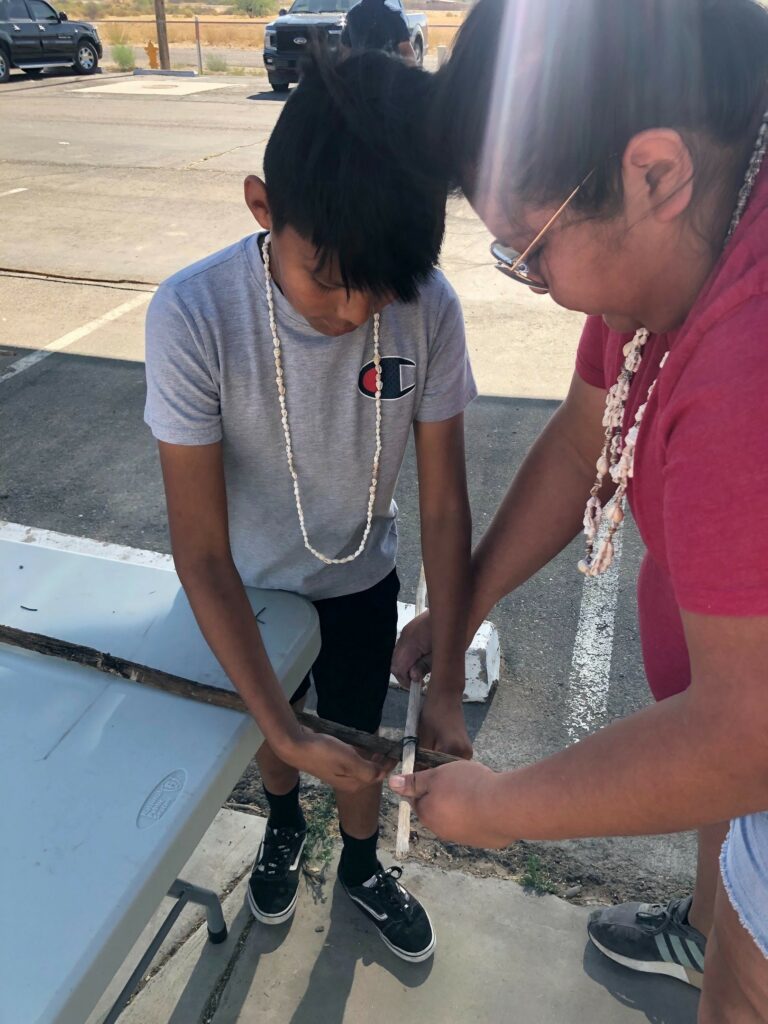Kaitlin Martinez, O’odham and Dine
Tribal Youth Resource Ambassador
Guest Blogger Kaitlin Martinez, O’odham and Dine and current Tribal Youth Resource Center Youth Ambassador shares a suggested approach to meaningfully engage tribal youth in cultural teachings.

Growing up I remember my late grandfather, my babysitter and my little brother’s father speaking O’odham (my language), listening to their conversations was something I’ll never forget, I felt connected and whole. I always would ask them questions and asked them how to say things but never really got lessons or had them talk to me in O’odham. At this time, I felt almost deprived of something I dearly wanted. I never questioned why I was not being taught, I just continued to listen every chance I got. As I got older I eventually asked my mother how to say certain things and she knew how to say words but couldn’t really hold a conversation in our language. Then I asked her why she never taught us our language. Her response was that her grandparents were punished for speaking their language, they didn’t want that for their kids or their grandchildren. They wanted them to be successful in the modern world and felt that their language would hold them back. My maternal grandmother had become an orphan at an early age and was raised in the church, she was also punished for speaking her language in boarding school. She never wanted that for her children and didn’t teach them much of her old ways.
This was a survival tactic, and it was what they felt was best for their family at the time. It had trickled down to the way I was raised, we were raised in the church so much that we even went to catholic school.
When school started, we were required to participate in culture class, this was my first consistent source of language. Our culture teacher taught us numbers, colors and the name of animals in kindergarten. We advanced to learning orthography in second grade and eventually learned how to read and speak sentences in O’odham. Amongst all this we were learning songs and dances, our culture teacher knew a lot and passed it down to us. She was very strict and expected us to be perfect and didn’t want to be disappointed. Most of my classmates thought of her as mean and intimidating, even though her approach worked for me because I was raised in a tough household. I knew my peers did not look forward to culture class the way I did, even to the extent of not wanting anything to do with language after we promoted.
I had to reflect and remember the way my peers felt and find a different approach – coming from a place of love and mutual respect. Realizing that our youth can teach you just as much as you can teach them. Giving the next generation their right in their day today. Your approach is everything, everyone is worthy of learning in a healthy environment. It is our duty as language speakers to pass down our teaching in a way that will reach as many people as possible and making sure you are making that meaningful impact on every individual. I had to remind myself that our language is a living thing, it runs through our blood and makes us who we are. It too has been hurt and challenged due to colonization, you have to be gentle and kind with it, in hopes that it will be passed down for generations to come.
I am grateful for my journey and know it has made me into the person I am today. I am so grateful for my grandparents and great grandparents for their unconditional love and sacrifices. They always had us in their best interest, I am humbled by their story. I am driven to keep learning and to keep speaking our language. Most of all I am honored to be gifted with all the knowledge stories and memories of my people. I am absolutely proud to be O’odham, most of all I love speaking and being a resource to my peers and youth. Remember you are worthy, and you are enough, keep speaking your language and keep learning. Let’s continue to be the light and come from a place of love in anything we do.
The Tribal Youth Resource Center thanks Kaitlin for her thoughtful words. To learn more about the Tribal Youth Resource Center Youth Ambassadors Initiative visit the Youth Hub page.